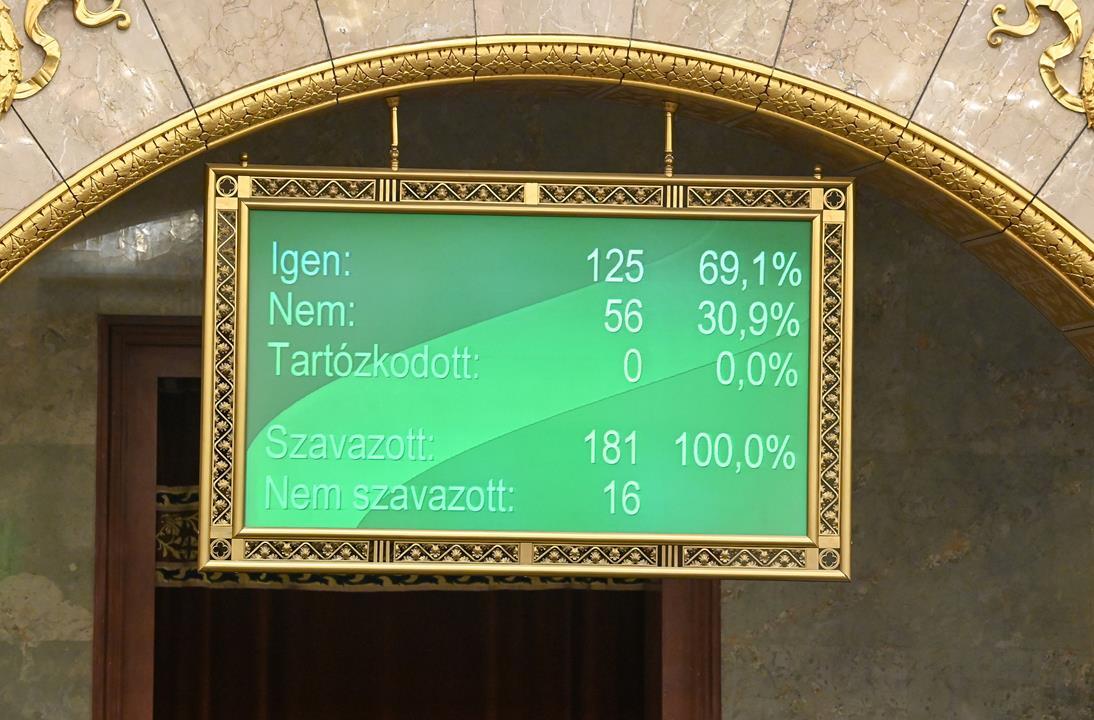Hungary’s 2025 budget approved, PM Orbán talked about peace budget before

The budget was passed with a vote of 125 for, 56 against and no abstentions. The preamble to legislation calls the 2025 budget the budget of the new economic policy. Next year, the end of the Russian-Ukrainian war will be finally within sight, and peace will allow more money to be spent on economic development, wage increases, home creation, and family support.
Tax benefits increase significantly
The preamble states that in the coming years, Hungary will be able to double the tax benefits for children, provide workers’ credit for working young people in addition to student loans and introduce new home creation and housing subsidies.
The Demján Sándor Programme will support SMEs, while the budget guarantees the payment bonus pension equal to one-month amount, family benefits, and includes the implementation of the 21 points of the new economic policy action plan.
The budget targets revenue of HUF 38,728bn and expenditures of HUF 42,851bn. The deficit target is HUF 4,122bn.
The total expenditure of the European Union development budget for 2025 was set at HUF 3,719bn, the total revenue at HUF 2,221bn, and the deficit at HUF 1,498bn.
The budget calculates with 3.4pc GDP growth and targets a 3.7pc-of-GDP fiscal deficit. It assumes inflation will be 3.2pc.
The year-end state debt-to-GDP ratio is expected to fall from 73.2pc this year to 72.6pc at the end of 2025.

Debt and utility protection
The budget allocates HUF 100bn to reserves.
Expenditures on debt servicing are set to climb from HUF 3,144bn this year to HUF 3,876bn next year.
The government continues to maintain its utility protection measures, the budget allocates HUF 880bn to Energy Ministry’s residential utility protection fund.
Expenditures on prenatal baby loans are set to climb from HUF 226bn to HUF 250bn. Local government’s spending on child nutrition tasks rise from HUF 105bn to HUF 145bn.
The budget allocates HUF 487bn for the payment of pensioner’s one-month bonus pension, up from HUF 449bn this year.
The budget of the health insurance fund exceeds HUF 4,706bn, after HUF 4,423bn this year.
The budget of the courts will increase from HUF 155bn to HUF 192bn next year.
Additional budget increases
The budget includes HUF 1,305bn of support for local governments, compared to HUF 1,049bn this year. Local governments will have to pay a solidarity contribution, the amount of which will increase from HUF 307bn to HUF 360bn. Local governments will also have an obligation to pay after the surplus of their local business tax revenue for the amount of HUF 65bn.
According to the preamble, next year’s national defence spending will exceed HUF 1,750bn and law enforcement spending will reach HUF 1,400bn. Planned spending on national defence will reach 2pc of GDP in 2025.
The preamble says education spending will near HUF 3,900bn and more than HUF 3,700bn will be available for healthcare purposes. The cabinet is providing more than HUF 3,750bn for family support, and is spending HUF 7,200bn on retirement benefits and pension-type benefits.
More than 300 new investments will be launched in 2025, with a total cost exceeding HUF 8,100bn, of which the share for 2025 is HUF 480bn.
General government deficit reaches HUF 3,284bn in November
Hungary’s cash flow-based general government deficit reached HUF 3,284.3bn at the end of November, the Finance Ministry confirmed in a detailed release of data on Friday.
The central budget had a deficit of HUF 3,257.5bn at the end of the month and the social security funds were HUF 226.8bn in the red, but separate state funds were HUF 200.0bn in the black.
Alone in November, the general government deficit came to HUF 233.8bn.
“The government has stabilised the fiscal balance this year, while closely following the development of the deficit,” the ministry said. “The government remains committed to improving balance indicators, while putting the economy on the sustainable growth path,” it added.
Interest expenditures came to HUF 3,412.7bn in January-November, climbing by HUF 798.1bn from the base period, the ministry said, noting that the fall in forint interest rates started in 2023 was showing up in cash flow-based interest expenditures with a delay.
Accrual-based interest expenditures will decline substantially in 2025, it added.
The ministry reaffirmed the government’s commitment to reducing the general government deficit: to 4.5pc in 2024, 3.7pc in 2025 and to under 3pc in 2026.







